- Home
- Francine Mathews
Too Bad to Die Page 2
Too Bad to Die Read online
Page 2
The pyramids—Great and Small—sickened her with their stillness. The flat, impenetrable stones devoured light and exhaled darkness. They sat like God at her elbow, assuring her that she was tiny and mortal, and she hated them for it. In the rare moments when she was alone like this, Pamela could feel a grave beneath her toes, and it frightened her. She was waltzing on the edge.
She turned her back to the window—her gorgeous, supple, peach-flushed back—and stared at herself in the mirror. Like everything Pamela possessed, her evening gown was far too expensive for war. It informed the world that she had powerful friends. And that they gave her things.
Her hair glowed like warm brass. Her dark blue eyes were restless. She wanted a good time tonight, because in two days they would all fly to Tehran, and Averell would be there. She would drink deep and seduce every man within reach. She had a talent for it.
Pamela leaned toward the mirror. Smoothed her lipstick with the tip of a finger. It was a deep red Guerlain shade from New York; Ave had brought her several of the special green-topped lipsticks the last time he visited his wife. Which of the men, she wondered, would want to kiss her tonight? And give her power over him—for as long as she liked?
Moody, dangerous Ian—or his piano-playing friend?
She smiled at her reflection. Pamela Digby Churchill was very like a mirror. A hard and beautiful surface few things could crack.
—
THE MAN IN THE WHEELCHAIR found the bulk of the Great Pyramid a comforting presence in his sitting-room window. He was smoking a cheroot near the open casement, unconcerned by the desert’s dropping temperature at dusk. It had taken him nearly two weeks to reach Egypt, first by naval vessel and then by air, and he felt drained. The constant effort to pretend otherwise—to appear strong and sharp and to stand upright for the cameras, even if it meant supporting his useless lower frame with his whitened knuckles pressed hard against a desk’s surface—was growing tedious. He wanted time and space to think. These brief moments in the shadow of vast stones were precious, like a deep breath drawn at high altitude.
“Sam,” he said, removing the cheroot from his mouth, “is there some kind of threat I should know about?”
“You mean besides the Germans, Mr. President?”
“Rommel turned tail a year ago. You know that.”
Sam Schwartz, Franklin Delano Roosevelt’s Secret Service chief, peered out the window. The villa placed at their disposal belonged to Alexander Kirk, the U.S. ambassador to Cairo. It sat within spitting distance of the Mena House Hotel, where this conference was taking place. Roosevelt found the villa comfortable and airy; Kirk was a flamboyant man who spent his cash well. The food was better than the White House’s. His son Elliott and his daughter Anna’s husband, John, were both traveling with him, and they seemed to be having a high old time. Nobody’d mentioned security. But Schwartz would be acutely aware of it: he’d prepped Kirk’s villa for this visit, installing wheelchair ramps and making sure the Signals equipment was specially wired. Roosevelt had glimpsed Schwartz’s men at strategic spots, indoors and out, with a startling number of Thompson submachine guns. One of the smaller hotel dining rooms had even been doctored with a false ceiling and soundproof walls, so that no hint of high-level discussions could reach Cairo—where any number of spies would love to pay for it. When he and Churchill sat down to talk, Roosevelt thought, the whole world tried to listen. Their chats determined who would live and die.
“The State cables are clear, sir. Nobody outside of Egypt even knows we’re here,” Schwartz said. As though Franklin were a small child who needed soothing. Or a cripple, trapped in a rolling chair.
After twenty years, Roosevelt was used to the numbness in his legs—but he’d never learned to accept his vulnerability. If an attack came, he’d be unable to run from the whistling bombs or the sudden hailstorm of machine-gun fire. What galled him most was the idea that somebody else might die in a crisis because they’d turned back to save him. But from the moment of landing on the dirt airstrip at Giza a few days before, he’d known there was no safer place in North Africa. Mena House was an armed camp. Acres of gardens, stables and chicken coops, a languid pool terrace, and a golf course were cordoned off with barbed wire and a brigade of British infantry. Five hundred anti-aircraft guns were pointed at the sky. The hotel’s guests had been dismissed the previous week, and the entire staff was offered a vacation with pay. Enlisted men now worked as Mena House waiters. A tent city filled with soldiers from all over the U.S. and the British Empire stretched behind the hotel. They had overrun Alex Kirk’s villa, too. The transformation blared to the world: Stand back or die.
“Why do you ask?” Schwartz persisted.
Roosevelt drew a lungful of smoke. “There’s an RAF observation post on the summit of the Great Pyramid. Wasn’t there yesterday.”
The Secret Service chief smiled faintly. “That must’ve ticked off a few pit diggers.”
“And see the snipers? Positioned at intervals on the rest of the pyramids? Winston’s got wind of something.”
Schwartz’s smile faded. His eyes strayed from the snipers to a single telephone, connecting Churchill’s villa with their own.
“Fleming,” Roosevelt said thoughtfully. “Young Hudson’s friend. He’ll know.”
—
MAY-LING WAS drinking tea in the drawing room of the Royal Suite, shoes kicked off and her slim legs tucked beneath her. Unlike the Western potentates, she and her husband were lodged in Mena House itself. They commanded a drawing room, several bedchambers and baths, quarters for their personal servants, a private dining room, and a kitchen, where she could prepare her husband’s opium pipe at night. No one but the two of them knew she did this. There was a dressing room filled with Western and Chinese clothes where her personal maid presided over several Louis Vuitton trunks—one just for hats, another for shoes. She had brought twelve handbags and thirty pairs of gloves to Cairo. The dust, she’d heard, was terrible.
During the past year, May-ling had toured the length and breadth of the United States, which was like her second home. Correction. Her only real home. And she had shopped well. Only the most elegant and exquisite clothing adorned her body, because she was the face of a civilization.
Madame Chiang. The uncrowned empress of China.
While the Generalissimo fought his own people and the Japanese—months of losses, of vicious and brutal death—she had addressed both Houses of Congress. She had raised her glass to well-meaning patrons in Poughkeepsie and Detroit and Sioux Falls and Menlo Park. Americans hated the Japanese after Pearl Harbor and were desperate to find an Asian they could trust. May-ling spoke English with a southern accent. Her brief childhood was misspent among the mosquitos and missionaries of Georgia. Unlike her Buddhist husband, she was a Methodist, and a graduate of Wellesley College. Americans were fascinated by her exotic beauty and her obvious smarts. She’d collected millions of dollars for the Kuomintang cause.
“And what have you spent it on?” she demanded, as her husband fitted a cigarette to his lighter and crossed one perfectly creased trouser leg over another. “Payoffs to your cronies. Rivals whose loyalty you have to buy. And women, of course. There are always women.”
“Just as, I understand, there have been men.”
She did not answer him; he had the best possible sources and he was uninterested in protest or denial. She merely held his gaze and refused to think of what might incriminate her.
“You will sit next to Churchill tonight,” he instructed. “Distract him. Bring his daughter into the conversation. She watches me too closely for my taste.”
“If you knew anything about women, you’d realize Sarah is unimportant,” May-ling flung back at him. “When the old man wants something, he trots out the other one. Pamela.” She uttered the English name with distaste. Her husband had danced with the girl last night and enjoyed it. He was a connoisseur of women, but R
ound Eyes with red hair and pillowy breasts were rare in his experience.
“The Golden Devil is a fool,” Chiang Kai-shek said mildly. “And you are jealous.”
“You are a fool.” She took a delicate sip of tea. They had found green leaves for the celebrated guests and her maid had brewed the pot herself; still, the result was disappointing. “Wasting the Americans’ money. What will you say when they ask what you’ve done with it?”
“Tell them I need more.” He gazed at her through his cigarette smoke, amused. “That’s how these things work. That’s why we’re here, to demand that Roosevelt bomb the Japanese from bases in China he’ll pay us to build. With materials he will provide. And American engineers. The bombs will be American, too, and so will the planes and pilots. We’ll let the Round Eyes defeat our enemies—and pay us for the privilege.”
“And if Roosevelt refuses?”
He rose and crossed the room to her. Sank down on the sofa where she was perched. Gripped her chin with the strength of a vise. The other hand held his burning cigarette close to her perfect cheek. He had ordered the death of millions with those hands during the White Terror. He called the victims Communists, but some of them, she knew, he’d once called friends.
“Never question my methods. American money keeps you alive, darling.”
She’d taught him the English word, the only one he knew, when he’d divorced his chief wife and three concubines. She’d thought then it was because he loved her. Wanted her. She knew now that the only thing he wanted was power. Her sister was Sun Yat-sen’s widow; Chiang was Sun’s political heir. He’d married May-ling for her family.
The glowing end of his cigarette wavered near her eye.
“It’s too bad you’re not invited to Tehran,” she said, defying her danger. “That’s where the real decisions will be made. This conference means nothing. These lords give you money to keep you quiet—like scraps of meat thrown to a dog. But they expect you to bite Japan’s neck. And then what use is the vicious beast to them? You’re a cur they can’t trust. A cur they will put down. You’re the one being used, Kai.”
“You will sit next to Churchill,” Chiang said softly. “You will find out why he’s afraid. I can smell the fear coming off his skin like rancid fat. Find out what he wants from this conference in Tehran, darling. For China.”
“For you, you mean.”
“I am China.” He released her. “England’s enemies pay highly. And China wants something to sell.”
—
“GOD, SHE MAKES ME FEEL FILTHY,” Sarah Churchill Oliver muttered as she wrapped her kimono around her slim body and quietly closed the bedroom door. “Just the look in her eyes. Smug. And knowing. She guessed you were in here.”
“Probably knocked on my door first.” Gil Winant’s mouth lifted in a smile. “What’d she want?”
“Said there was a wire for Commander Fleming, and did I know where he was? I suppose she’s after poor Ian now. One more tame tiger on Pamela’s leash. I told her to go up to the hotel. Somebody’ll buy her a drink.”
“I was surprised to see her on the plane, frankly. Diplomatic missions aren’t her style.”
“Father wanted her to come.” Sarah sounded forlorn. “She plays bezique with him when he can’t sleep. His nights are getting worse and worse, Gil, and this flu isn’t helping.”
“Well, if a game of cards with a doting daughter-in-law can win the war for Britain . . .” Winant rolled off the bed and reached for his jacket. “I’m sorry you have to put up with her, Sal. I thought we’d seen the last of her once she got her own place in Grosvenor Square.”
“Not a chance, Mr. Ambassador. Our Pammie has her claws in the Prime Minister of Great Britain. She’s borne his grandson, for God’s sake. And named him Winston. She’ll never let us go. She can call herself a Churchill until she dies—even if she does divorce my brother, Randolph, one of these days.” Sarah leaned against the bedroom door and studied Gil coolly. “Did you know she sleeps in the War Rooms sometimes? In the top bunk, right over Father? He won’t hear a word against her. No matter how many men she bags.”
The list was growing, as they both knew. Averell Harriman, possibly the wealthiest American in the world and Roosevelt’s ambassador to the Soviet Union, was quietly paying for Pamela’s new apartment and most of her expenses by a circuitous banking route from Moscow; but now that he’d left England, she was frequently seen around London with everyone from Jock Whitney to Bill Paley and his famous reporter, Edward R. Murrow. Pamela liked acquiring Americans, but she wasn’t exclusive; Lord Beaverbrook, the British press baron, supported her infant son and his nanny at Cherkley Court, the Beaverbrook estate in Surrey. A complement of variously starred generals supplied Pamela with the necessities of life. Fresh beef. Silk stockings. Trifles studded with diamonds and emeralds. Emeralds were particularly striking with her titian hair.
“She probably gets a lot out of her men,” Winant said thoughtfully. “And I don’t mean money. She learns things, Sal. And passes them on. I bet your dad finds that damned useful. Love Pam or hate her, she’s got the makings of a great political courtesan.”
He was right, of course. They both knew Pamela Digby had won Churchill’s heart from the moment she sailed into the family and took Randolph off their hands. As a child, Sarah’s brother had been difficult; as an adult, he was a hard drinker, a hopeless gambler, and a bruiser with an uncontrolled temper. For a few months, Pamela had seemed like a God-given answer. A steadying influence. A good woman whose love could save even Randolph. The fact that Pamela was neither steady nor good was apparently beside the point. Randolph’s abandonment—and Pam’s determination to ignore it—had only ranged his parents more firmly on his wife’s side.
It occurred to Sarah that Gil was right. Her father appreciated the courtesan in Pamela. Used it, even, in a way he would never appreciate or use any of his own daughters. Sarah felt suddenly like weeping. She had spent much of her youth trying to escape the Churchill name, the Churchill madness—running away to the stage and an unhappy marriage with a showman who was too cheap and too old for her—and now, in the midst of this bloody war and her father’s visible decline, she wanted nothing so much as to belong to him. One of the most brilliant and demanding personalities on earth.
Gil didn’t have to be told any of this. He seemed to understand everything important about Sarah and her troublesome family. Not because he was one of Roosevelt’s trusted men or had twice been governor of New Hampshire or because he had raised two sons himself. Gil was a philosopher and a lover of poetry, a quiet and inward-looking man whose simplest pronouncements rang with existential truth. He hated to speak in public, but he’d won British hearts by risking his life in bombing raids and promising far more help than America would ever give. Sarah suspected he’d gladly die if it would save her country from annihilation—and he’d do it in a heartbeat to save her. Which meant that she’d already destroyed something precious in Gil Winant. Because the man with more integrity than anybody in England had left a wife behind in the United States.
She was no better than Pamela after all, Sarah thought. An adulteress who took her happiness in both hands. But unlike Pamela, she was strangling it with guilt.
“Ever had turkey?” Gil asked her now.
She shook her head.
“It’s dry. Go for the stuffing instead.” He kissed her cheek. “See you at dinner.”
He glanced down the villa’s empty hall, then slipped noiselessly from her room on stocking feet. Sweet of him, but Sarah wondered why he bothered to tiptoe. If Pamela knew they were lovers, so did the entire British delegation.
—
“I LOATHE and abominate that sly dog of a Chiang,” the Minister for War Transport, Lord Leathers, was saying petulantly as he sipped his whiskey. His short legs were stuck straight out on the wool carpet, as though discarded by his round body. “He wants to bugger our under
standing with President Roosevelt. Nattering on, in his slit-eyed way, about Colonials. Playing up the democratic bit. Deploring our nasty British ambitions. Our postwar plans to buy and sell them all, from Shanghai to . . . to . . .”
Leathers’s knowledge of the world momentarily failed him; he had left school at fifteen. A shipping magnate with a shrewd and canny sense of sea lanes, certainly, but no Public School education. That was what Ian was for.
“Guangzhou?” Ian suggested delicately.
“Indeed!” Leathers grunted, and raised his glass.
Ian topped it off. “I’d like the name of his tailor. Fellow’s extraordinarily well dressed.”
“Blasted Orientals,” Leathers continued, swallowing. “You’d think enough of our sort had died in that Boxer business to satisfy the bloodlust of ’em all. But no. Our yellow friends would rather the Japanese raped their women from here to there and sideways than we turned an honest pound selling tea. I ask you, Ian—”
“Don’t,” he interrupted, pouring out three fingers of Scotch and handing it to Michael Hudson. “Ask Hudders. He’s the one who’s got the President’s ear. Does Roosevelt give a damn what Chiang Kai-shek wants, Michael? Or is he just throwing the Chinese a bone?”
The three men had met in one of the hotel’s side lounges to brace themselves before dinner, which would be a protracted and formal affair—Roosevelt was hosting the American celebration of Thanksgiving tonight. He’d brought twenty-two turkeys to Egypt, along with his aide Harry Hopkins, a few generals, and assorted hangers-on like Michael Hudson.
Hudson had flown uncomfortably into Egypt in the cargo plane carrying Roosevelt’s car. His job was something vaguely to do with Lend-Lease, the American program that allowed Britain to borrow everything from old ships to new hospital beds. Hence his chumminess with Lord Leathers—who had negotiated the British end of that deal. His chumminess with Ian Fleming had long since been explained. It was their chiefs’ sixth bilateral meeting in two years, and the sight of Hudders and Flem clinking glasses in various conference rooms was old hat by now.

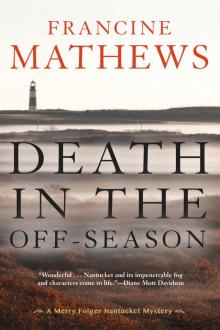 Death in the Off-Season
Death in the Off-Season Death in Rough Water
Death in Rough Water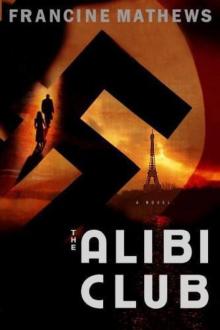 The Alibi Club
The Alibi Club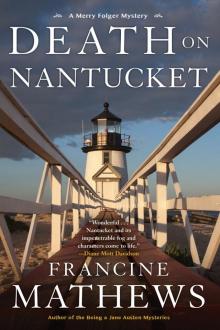 Death of a Wharf Rat
Death of a Wharf Rat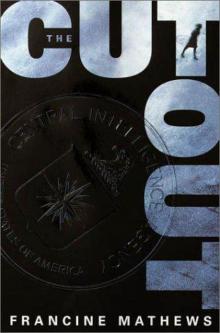 The Cutout
The Cutout The Secret Agent
The Secret Agent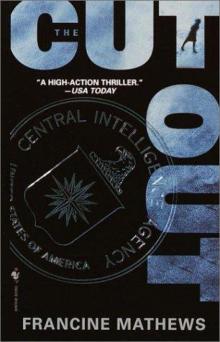 The Cutout cc-1
The Cutout cc-1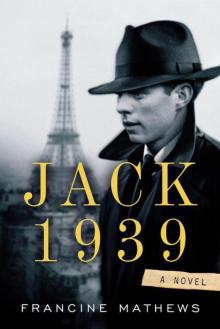 Jack 1939
Jack 1939 Death in a Cold Hard Light
Death in a Cold Hard Light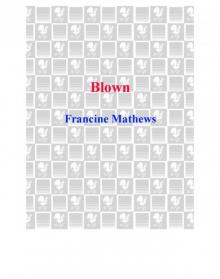 Blown
Blown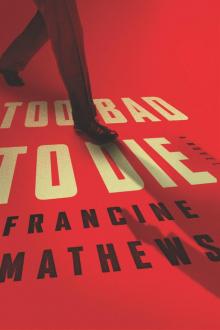 Too Bad to Die
Too Bad to Die